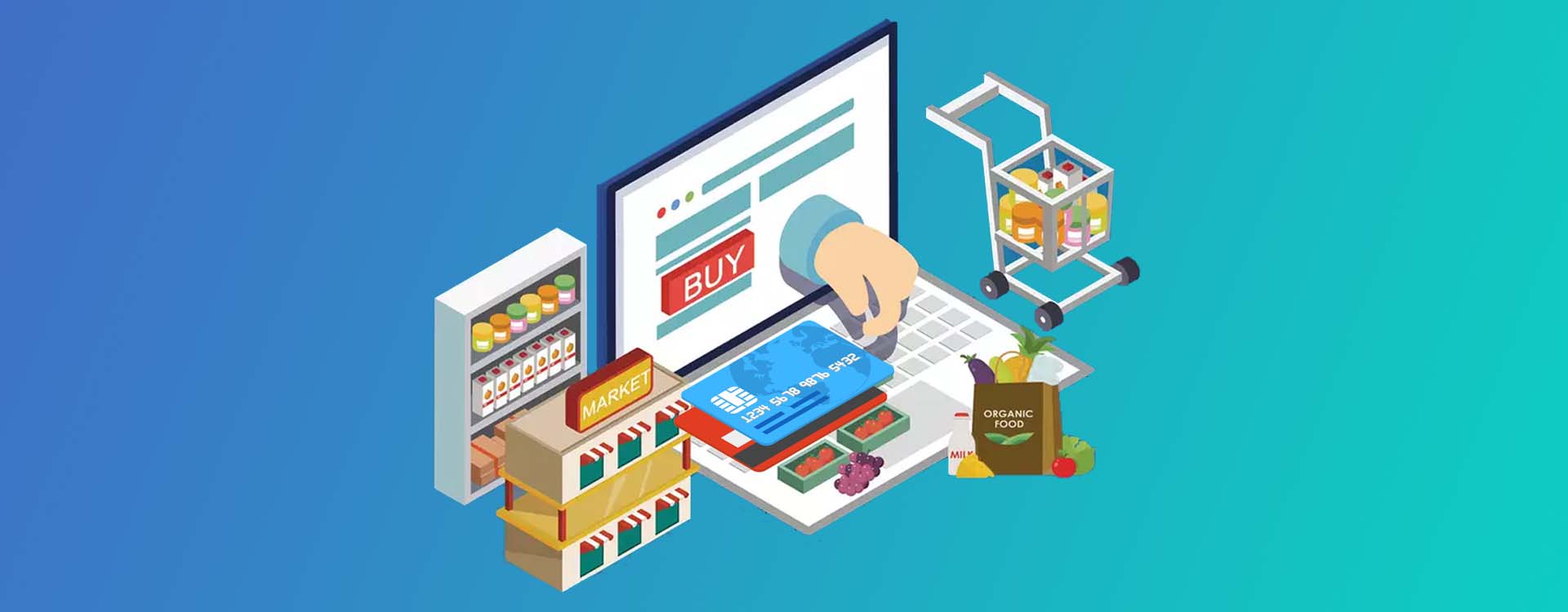If you aren’t aware of the grocery market in India, BigBasket’s name can instantly remind you of the potential of this sector. BigBasket is currently one of the biggest players in the e-Grocery space. But over the years, many more hyperlocal firms have emerged like Jio Mart, Spar, Amazon Fresh, etc. Speaking of hyperlocal grocery apps, there’s also Grofers, India’s e-Grocery unicorn.
Most of these names were offline supermarkets and hypermarkets which have quickly pivoted to an online presence during the pandemic. Digital Transactions have allowed them to quickly go online. It’s not just these big names, but the small brick-and mortar Kirana shops were able to survive and revive during the pandemic due to Fintech products and services.
Grocery challenges and needs during the pandemic
For a very long time, householders loved to physically walk into a store and pick up fresh fruits, vegetables, pulses, grains, and bakery products. But the pandemic has made this impossibile. Now both homemakers and working professionals simply place monthly orders for groceries on e-Grocery apps depending on who is offering the most attractive discounts and prices.
Fintech and Grocery partnership
The fintech and e-Grocery partnership has been long-standing. Even before the pandemic, digital wallets like Citrus, PayUMoney, MobiKwik, and Paytm were partnered with prominent e-Grocery companies like Grofers. They were mutually making profits by offering cashbacks, discounts, and reward points. But since the pandemic, their partnership has taken on a whole new level.
Kirana store partnership for essential items delivery
Hundreds and thousands of Kirana shops which were providing fresh grocery items had to suddenly go online and compete with e-Grocery giants. Fintech firms stepped up to help them in their digital transformation by providing digital payments services. Fintech companies have been launching apps and deploying POS systems for them.
Now, even the smallest Kirana shops in India have the PhonePe QR codes on their counters. Paytm also provides all-in-one QR codes for local shops and merchants to accept payments via Paytm wallet, Rupay cards, and UPI based payment apps. The local mom-and-pop stores even started accepting orders on WhatsApp and providing e-payment options through mobile wallets, apps, and cards.
A convenient payment model – BNPL
Buy Now Pay Later is facilitating robust partnerships between the fintech and grocery industry. The BNPL model works by extending a small-ticket loan to an e-Grocery shopper placing orders and making purchases for monthly or daily groceries online. The loans are instantly accrued either on the fintech app (the grocery platform redirects to the BNPL app).
In most cases, the BNPL service is integrated as a payment method during checkout in the e-Grocery platform. The BNPL model facilitates instant payments and bite-sized credit which are accessed by the shopper alongside the purchase. BNPL pays for your order free of interest but levies a minor late charge per day if you miss the repayment date.
For example, while checking out on BigBasket, you can choose the BNPL option on Simpl (A BNPL service). You will get redirected to Simpl’s login page and upon logging in, Simpl will pay for your grocery order and add the charge to your account which you can pay at a later date.
An instant real-time payment system
e-Grocery online shoppers can choose the UPI payment option while placing orders on smartphone apps. UPI is available as a payment option on RBI approved smartphones successfully verified and linked to one or multiple UPI accounts like Google Pay, Bhim UPI, PhonePe, etc. The UPI payment method is reflected on the checkout page where customers can choose their preferred UPI app. The amount will get directly debited from the customer’s bank account linked to their UPI ID. Grofers for instance, had earlier rolled out UPI for android devices.
UPI penetration has seeped into every household making this the most popular payment mode on e-grocery apps. UPI providers like Google Pay, Phone Pe, Paytm have partnered with grocery firms. In Google Pay, you can purchase daily essential items. You can view Google Pay’s partnerships with hyperlocal small businesses in the grocery sector in the ‘Business’ section on their app. Even Paytm features small businesses in the e-grocery segment on their ‘Paytm Mall’ section where they offer attractive discounts and deals for everyday essentials.
How this fintech startup took offline grocery online
An example of a partnership between fintech and e-Grocery has been PayNearby’s initiative to take offline grocery stores online. PayNearby is a fintech start-up which offers a hyperlocal delivery and purchase app. They onboarded more than 2 lakh pan-India Kirana shops on their hyperlocal discovery and purchase app to enable customers to order a wide range of products from their local Kirana stores.
‘‘
Noteworthy start-ups in India offering conversational AI and voice based B2B solutions.
What’s in it for me?
The voice tech industry has been evolving and Voice AI is seeing applications across numerous key industries including healthcare, retail, hospitality, customer service, etc. The Asian market is seeing high adoption of voice AI solutions for commercial applications. The reason why the Asian market is a hotbed for voice start-ups is due to the sheer diversity of languages, accents, and dialects. There’s huge potential for B2B voice tech start-ups to acquire clients in the government, across enterprises, as well as investor interest.
Conversational AI tools have high demand among enterprise contact centres since they are easing the process of customer communication and subsequently enhancing the customer experience. There’s also great demand for chat and voice-based bots that cater to multiple different languages among enterprise contact centres. Ever since the revelation that massive new markets open up by targeting regional languages in India, every industry is in a race to develop multilingual products. Whether its vernacular gaming apps, social media, or speech services, the whole of Indian population can become your consumer base by being inclusive of local languages.




